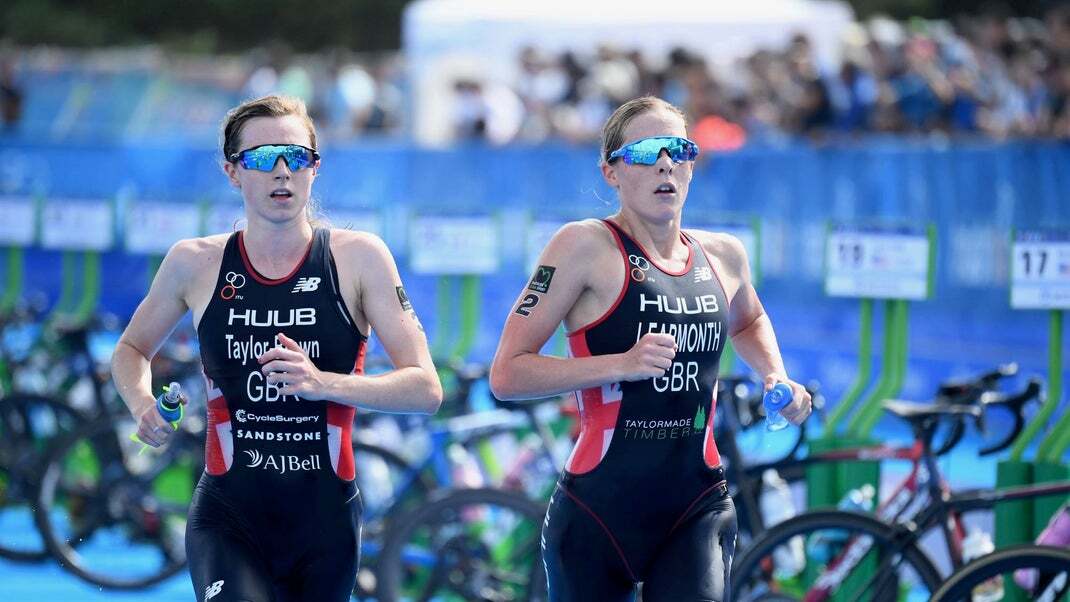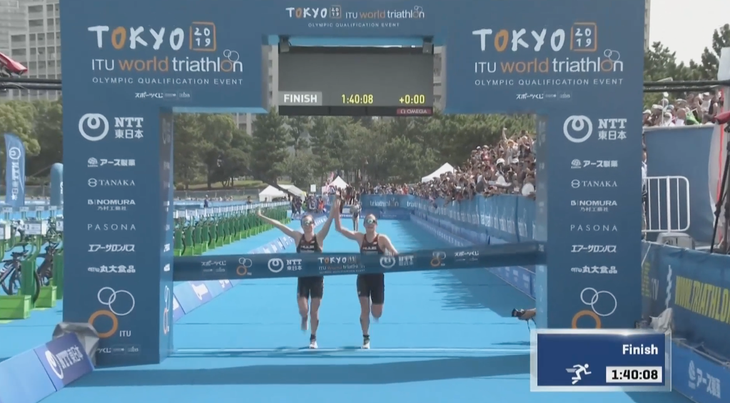Recalled: The Hand-Holding Finish Seen ‘Round The World

Credit: Delly Carr, Triathlon.org (Photo: Delly Carr, Triathlon.org)
When British triathletes Jessica Learmonth and Georgia Taylor-Brown toe the line of the Olympic triathlon next month, they’ll be among the medal favorites. After all, Learmonth, 33, and Taylor-Brown, 27, are ranked third and fourth, respectively, in the world, and have podiumed in nearly every race they’ve entered over the past year.
But wherever the pair finish in the Olympic field, just don’t expect them to be holding hands at the finish line.
Learmonth and Taylor-Brown learned this lesson the hard way at the Tokyo ITU World Triathlon Olympic test event on a sweltering, muggy morning in August, 2019 when the two crossed the finish line first, shoulder to shoulder—and hand-in-hand. What was meant to be a sign of solidarity between the Brits soon sparked a controversy that made headlines around the world.
Because some 20 minutes after Learmonth and Taylor-Brown finished that race, they were disqualified. According to the International Triathlon Union (ITU), the intentional tie was a breach of rules that state athletes must not “finish in a contrived tie situation where no effort to separate the finish times has been made.”
Instantly, social media (and, soon thereafter, mainstream media) firmly grasped hold of the controversy, with many athletes, columnists, and casual observers weighing in on whether the DQ was justified. Even lawyers chimed in with opinions.

“The decision is clearly right by the letter of the law, even though it is debatable as to whether this should be regarded as a contrived finish,” remarked Peter Charlish, a principal lecturer in law at Sheffield Hallam University in Sheffield, England at the time. “Of course it is horribly harsh for the British athletes. But if the ITU didn’t apply its own rules, others would have surely challenged them.”
Still, the disqualification was an unexpected buzzkill on a banner day for the Brits. Learmonth and Taylor-Brown had dominated the race in the bike and run, ultimately gapping third-place finisher Flora Duffy of Bermuda by about 10 seconds by the end of the 3.1-mile run (the race’s third leg was halved due to the heat). Their spontaneous, split-second decision to finish together wasn’t malicious and did not interfere with any other competitors. So why punish such a stunning display of sportsmanship? And it was a tough punishment, to boot: Aside from knocking them off the podium, the disqualification also stripped Learmonth and Taylor-Brown’s automatic Olympic berth for Team GB.
Those who closely followed the sport drew comparisons between the women’s finish and that of another British duo—brothers Alistair and Jonny Brownlee. At the 2016 ITU World Championship Final in Cozumel, Mexico, Alistair famously helped an ailing Jonny down the home stretch and shoved him over the line. Neither Brownlee was disqualified for that effort, as Alistair positioned Jonny in front of him so he placed second to his third. (Since then, the ITU rules shifted so that any athlete who physically assists the forward progress of another athlete on any part of the course will result in disqualification for all involved.)
For their part, neither Learmonth or Taylor-Brown seemed to be aware of the “contrived tie” rule. There are hundreds of pages of rules in the ITU handbook, and it’s not like other triathletes had finished holding hands in recent memory.
“Couldn’t have dreamt of taking the tape with G,” Learmonth wrote in an Instagram post after the race. “Feel we showcased our sport in the right way, hopefully showing young athletes it’s not always dog eat dog.”
Their DQ came as a shock, to the point where both were too upset to make a statement in the aftermath. The following day, Taylor-Brown tweeted, “Sucks for us, but it’s just one race, we promise not to do that again.”
Despite missing the automatic selection to the Olympic squad, both Learmonth and Taylor-Brown were chosen for the Tokyo team more than a year later in November, 2020, along with 2016 Olympic bronze medalist Vicky Holland. And even if the trio does manage to trot down the home stretch together when they return to Tokyo, their actual finish will surely be more of the socially-distant variety.